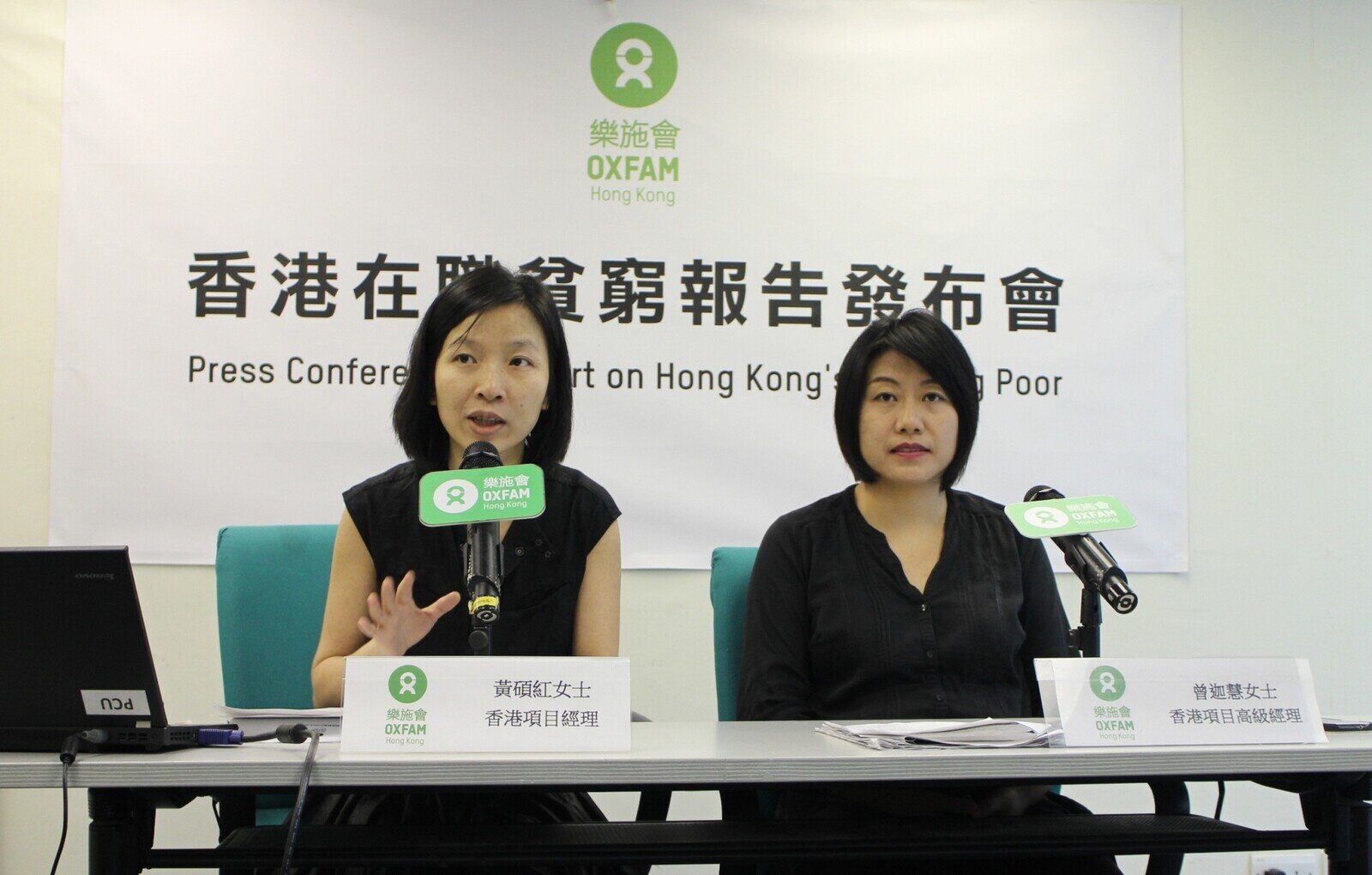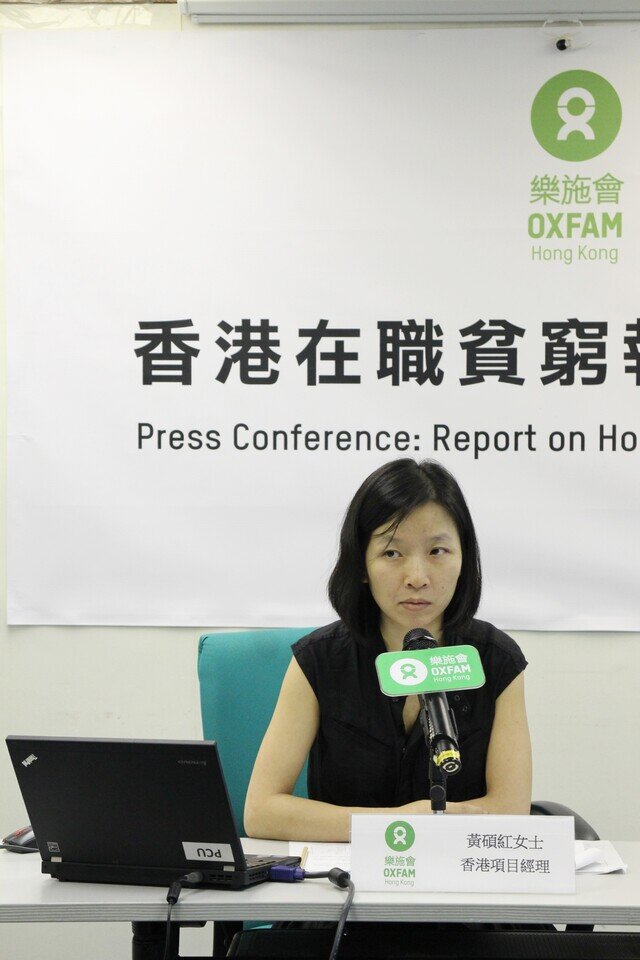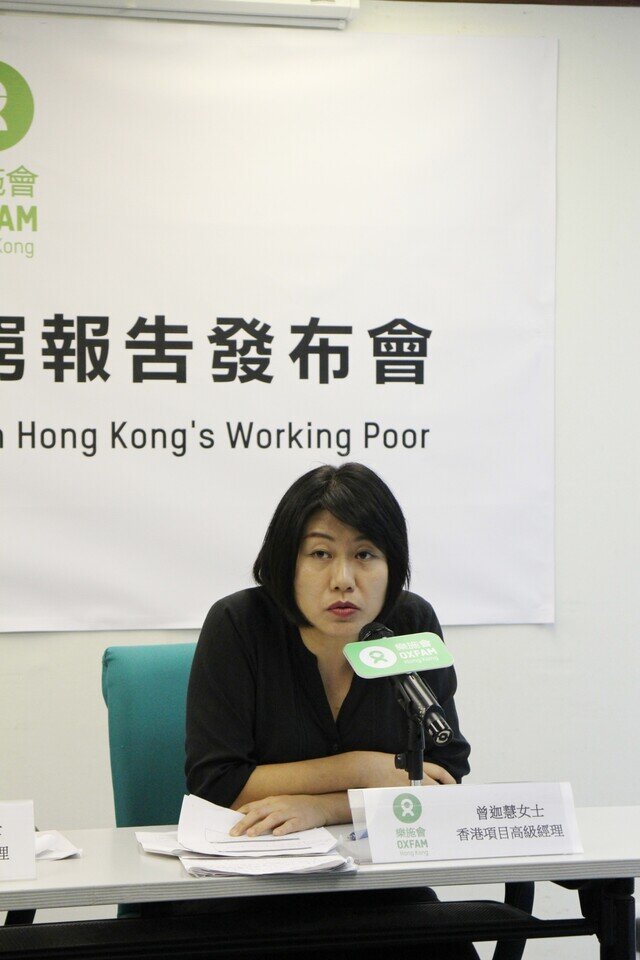29 SEP 2015
Number of working poor families rose 10 per cent to almost 190,000 over past five years
Oxfam urges the Government to scrap MPF offset mechanism and review minimum wage annually
Oxfam Hong Kong’s (OHK) latest report ‘Report on Hong Kong’s Working Poor (2010 – 2014)’ revealed that the number of working poor families rose by more than 10%, from around 170,000 in 2010 to almost 190,000 in 2014. The wealth gap has also been widening over the years. OHK thus urges the Government to review minimum wage annually in order to keep wages on par with inflation, and take the lead in abolishing the Mandatory Provident Fund (MPF) offsetting mechanism to ensure a reasonable standard of living for all workers.
Working poor statistics
In the report, working poor families are defined as households that have at least one employed person (excluding foreign domestic helpers) and earn a monthly household income of less than half of the median income for all households of the corresponding size.
- In 2014, there were 189,500 working poor families locally, which is an increase of 10.6 per cent from 171,400 in 2010; this population has reached 647,500.
- In 2014, about half of working poor households had dependents aged 15 or below, while a quarter had dependents over the age of 65. On average, each employed member of a working poor household must support two non-working members, making the burden of working poor households heavier than that of average households.
- More than half of working poor households (101,600 households) live on less than the average CSSA payment; only 7,584 were on CSSA, which represents just 7.5 per cent of households.
- Under the current biannual review system, minimum wage lags behind inflation. Although minimum wage increased by 16.1 per cent from HK$28/hour in May 2011 to HK$32.5/hour in May 2015, the accumulated inflation in the same period had gone up by 20.5 per cent.
- Working poor households spend most of their income on housing. According to the Population Census in 2011, there were 76,866 poor households living in privately rented property. Rental expenses accounted for up to 37.3 per cent of their monthly income, much higher than 24.3 per cent of average households’ expenses.
MPF fails to adequately provide workers with retirement protection
Currently, the MPF offset mechanism allows employers to offset severance payments (SP) and long service payments (LSP) using the accrued benefits from employers’ MPF contributions for employees. This leaves low-paid workers with hardly any retirement savings.
- Between 2010 and 2014, employers used HK$12.3 billion to offset SP and LSP – 30 per cent of the total amount of benefits withdrawn from employees’ MPFs.
- In 2014, there were 265,200 workers who were paid less than HK$7,100 a month, and whose MPF funds were thus solely dependent on their employers’ contribution. The offsetting mechanism has a great impact on these low-income workers.
- The Government, the biggest employer in Hong Kong, employed over 57,000 outsourced workers in 2014. Due to contract terms, outsourced workers face the risk of being laid off and re-employed every two to three years. Outsourced workers’ MPFs are thus repeatedly offset, placing these workers at greater risk of falling into poverty after retirement.
Inequality in Hong Kong
- Inequality in Hong Kong is extreme. According to Credit Suisse, the wealthiest 1 per cent in Hong Kong owns more than half (52.6 per cent) of Hong Kong’s total wealth, whereas the wealthiest 10 per cent owns 77.5 per cent of Hong Kong’s wealth, which is the highest among developed regions globally.
- According to Forbes, the wealthiest 25 people in Hong Kong had a total wealth of HK$1.513 trillion, which is more than the Government’s reserve of HK$1.5 trillion.
- In 2014, the median monthly household income of the top decile was 19 times that of the lowest decile; the gap between the two extremes has been widening over the past three years.
OHK’s recommendations
OHK maintains that all working people have the right to a decent basic standard of living for themselves and their families. It is unjust for our society to see people working hard but still being unable to make a living. With extreme inequality in Hong Kong and poor people put at a disadvantage, corporations – which have a wealth of social resources should be more socially responsible. Oxfam urges the Government and the private sector to take up a greater role in tackling poverty issues in the following ways:
- Abolition of MPF offsetting mechanism
We urge the Government, as the largest employer, to take the lead in scrapping the MPF offsetting mechanism in order to protect all of its contracted and outsourced employees. In addition, it should set a timetable for the total abolition of this mechanism in all sectors in the long run, so as to prevent workers from falling into poverty and being forced to rely on CSSA after retiring. We also urge employers to work with the Government and labour sector to achieve this goal as soon as possible to provide employees with better retirement protection.
- Affordability should be considered when evaluating effectiveness of public housing policy on poverty alleviation
While OHK agrees that public housing should be included in evaluating the effectiveness of poverty alleviation policies, we suggest the Government to take into account the affordability of the low-income households and set a ceiling on the market value of public housing at 30 per cent of working poor households’ incomes. The proposal takes reference from overseas practices, such as those of the United States, Canada, Australia and New Zealand, which have adopted a median rent-to-income ratio of 30 per cent as a benchmark and ceiling for the market value of public housing. This can more accurately reflect the effectiveness of public housing policies on poverty alleviation.
- Review minimum wage every year to keep up with inflation
According to our study in 2014, we suggested that minimum wage should be set at HK$35/hour, as this took into account the inflation rate and basic standard of living. Despite the increase to HK$32.5/hour in May 2015, inflation is widening the gap between the current and suggested levels, and so minimum wage is failing to support workers’ and their families’ basic cost of living. We thus urge the Government to review the minimum wage annually and make sure it is adjusted such that it keeps up with inflation.
- End -
About Oxfam
Oxfam is a worldwide development organisation that mobilises the power of people against poverty.
For media enquiries, please contact:
Clara Law
Assistant Communications Officer
Telephone: + 852 3120 5272/ + 852 6088 8930
Email: [email protected]
Wong Shek-hung
Hong Kong Programme Manager
Telephone: +852 3120 5279
Email: [email protected]
Learn more about working poverty in hong kong
After analysing the Census and Statistics Department’s data between 2010 and 2014, Oxfam found that the number of working poor families rose by 10 per cent to almost 190,000 over the past five years.
‘In 2014, more than half of working poor households lived on less than the average CSSA payment,’ said Wong Shek-hung, Oxfam’s Hong Kong Programme Manager.



